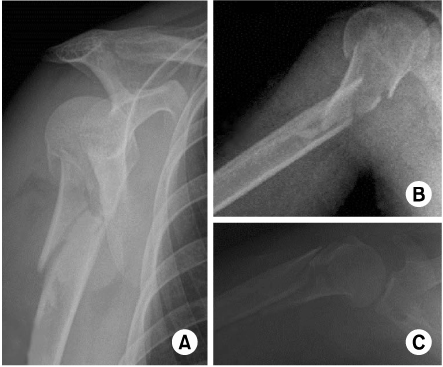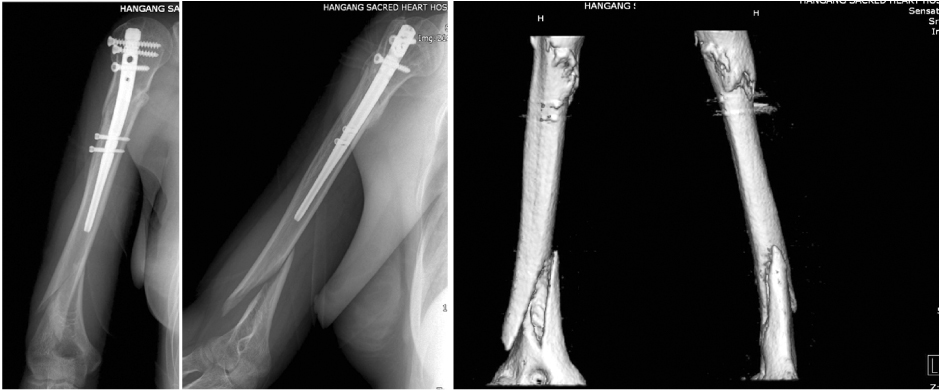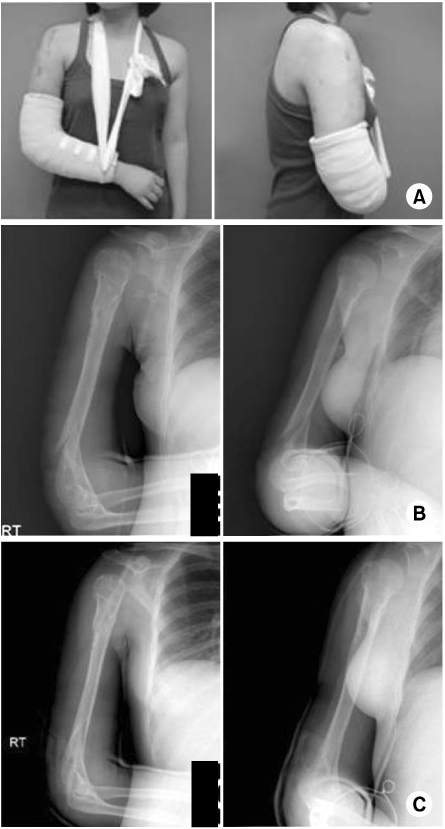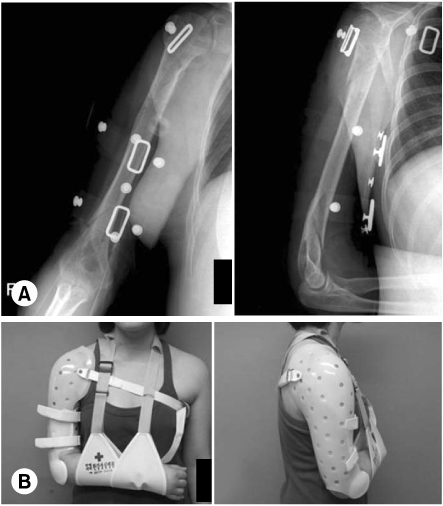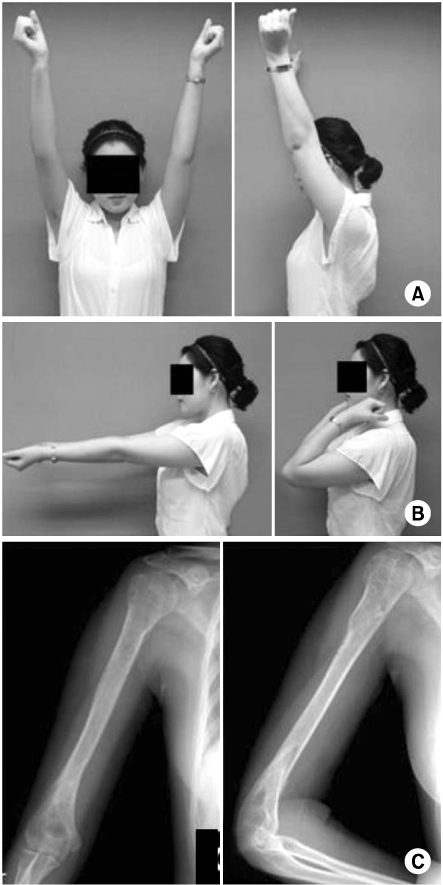J Korean Fract Soc.
2011 Apr;24(2):185-190. 10.12671/jkfs.2011.24.2.185.
Periprosthetic Fracture after Proximal Humeral Intramedullary Nail, Treated by Functional Bracing: A Case Report
- Affiliations
-
- 1Department of Orthopedic Surgery, Hangang Sacred Heart Hospital, College of Medicine, Hallym University, Seoul, Korea. hgchang@hallym.or.kr
- 2Department of Orthopedic Surgery, Shin Hospital, Suwon, Korea.
- KMID: 2183863
- DOI: http://doi.org/10.12671/jkfs.2011.24.2.185
Abstract
- Periprosthetic fracture following a proximal humeral intramedullary (IM) nailing is rarely reported neither for its occurrence nor for its treatment. Proximal humeral IM nail (Acumed, LLC, Hillsboro, OR, USA) has been increasingly reported of its successful treatment outcomes, yet there is paucity of data describing its complications. Here we report a 26 year-old female patient, who sustained a proximal humerus fracture which was initially successfully treated by proximal humeral IM nail, and was complicated by a periprosthetic fracture distal to the nail tip at postoperative 4 months. Serial application of U-shaped coaptation splint, hanging cast, and functional bracing resulted in satisfactory clinical outcome. Periprosthetic fracture after proximal humerus IM nail can occur by a low energy injury, which need to reminded in treating young and sports-active patients.
Figure
Reference
-
1. Boyd AD Jr, Thornhill TS, Barnes CL. Fractures adjacent to humeral prostheses. J Bone Joint Surg Am. 1992. 74:1498–1504.
Article2. Chin PY, Sperling JW, Cofield RH, Schleck C. Complications of total shoulder arthroplasty: are they fewer or different? J Shoulder Elbow Surg. 2006. 15:19–22.
Article3. Groh GI, Heckman MM, Wirth MA, Curtis RJ, Rockwood CA Jr. Treatment of fractures adjacent to humeral prostheses. J Shoulder Elbow Surg. 2008. 17:85–89.
Article4. Kang HJ, Lee DY, Sung SY, Hahn SB. Intramedullary nailing for the fracture of proximal humerus. J Korean Fract Soc. 2004. 17:271–276.
Article5. Kazakos K, Lyras DN, Galanis V, et al. Internal fixation of proximal humerus fractures using the Polarus intramedullary nail. Arch Orthop Trauma Surg. 2007. 127:503–508.
Article6. Kent ME, Sinopidis C, Brown DJ, Frostick SP. The locking compression plate in periprosthetic humeral fractures. A review of two cases. Injury. 2005. 36:1241–1245.
Article7. Lin J, Hou SM, Hang YS. Locked nailing for displaced surgical neck fractures of the humerus. J Trauma. 1998. 45:1051–1057.
Article8. Sarmiento A, Zagorski JB, Zych GA, Latta LL, Capps CA. Functional bracing for the treatment of fractures of the humeral diaphysis. J Bone Joint Surg Am. 2000. 82:478–486.
Article9. Sarraf KM, Singh R, Corbett SA. Distal humeral plating of an intramedullary nail periprosthetic fracture using a miss-a-nail technique: a case report. Cases J. 2009. 2:6704.
Article10. Seo GY, Ahn JK, Kim YW, Kim JH, Rhee JH. Treatment of humerus shaft fractures using hanging arm cast with plastic cast. J Korean Soc Fract. 1991. 4:8–14.
Article11. Tsiridis E, Haddad FS, Gie GA. The management of periprosthetic femoral fractures around hip replacements. Injury. 2003. 34:95–105.
Article12. Tsiridis E, Spence G, Gamie Z, El Masry MA, Giannoudis PV. Grafting for periprosthetic femoral fractures: strut, impaction or femoral replacement. Injury. 2007. 38:688–697.
Article13. Worland RL, Kim DY, Arredondo J. Periprosthetic humeral fractures: management and classification. J Shoulder Elbow Surg. 1999. 8:590–594.
Article14. Wright TW, Cofield RH. Humeral fractures after shoulder arthroplasty. J Bone Joint Surg Am. 1995. 77:1340–1346.
Article
- Full Text Links
- Actions
-
Cited
- CITED
-
- Close
- Share
- Similar articles
-
- Humeral intramedullary nail bending following trauma: a case report
- Polarus Intramedullary Nail for Proximal Humeral and Humeral Shaft Fractures in Elderly Patients with Osteoporosis
- Treatment of the Humeral Shaft Fracture: Comparison between Functional Bracing Technique and Closed Intramedullary Fixation with Functional Bracing Technique
- Removal of the Humeral Nail by using a Cannulated Screw: A Case Report
- Evaluation of Shoulder Function Before and After Removal of Humeral Interlocking Nail

